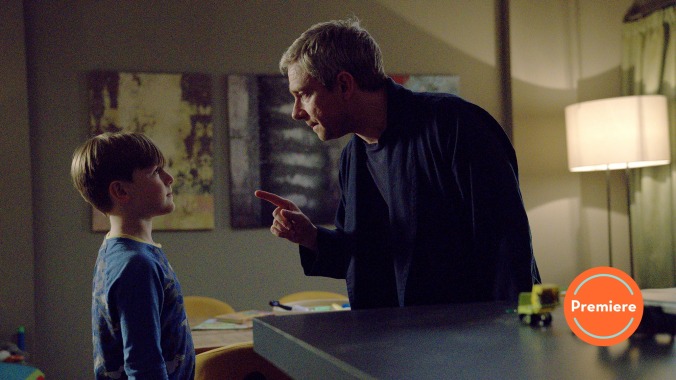Parenting is an unforgiving nightmare on FX's new dramedy Breeders

About halfway through the series premiere of Breeders, Paul (Martin Freeman), currently suffering through a sleepless night dominated by two restless toddlers with endless energy, thinks back to a time when him and his wife Ally (Daisy Haggard) only had a newborn. The sunny haze of the flashback suggests a more idyllic, peaceful time, as Paul rocks his baby to sleep for a midday nap. But then, as soon as the baby touches the bassinet, it begins to wail, and in response he directs a few F-bombs at the baby and pleads with it to “compromise” about nap time.
That moment is indicative of much of the premiere; there’s a lot of shouting, even more cursing, and nary a moment of joy in sight. Thinking about some contemporary dramedys, Breeders has more in common with Catastrophe than Parenthood or even Better Things. “No Sleep” presents an absolute nightmare of an evening, where Paul and Ally take turns trying to get their children to sleep, only for the situation to get worse with each passing hour. There’s no saccharine Jason Katims-inspired moments here; nothing gets better.
It would seem that what “No Sleep” is aiming for is some level of authenticity, and there are times when it certainly manages to capture if not the reality of parenthood, at least the feeling of being a parent. In other words, sometimes a sleepless night, which happens every now and then, feels like the end of the world to a parent who’s also thinking about work and the bills and what the next day looks like on no sleep. Everything becomes exaggerated, and as a parent you’d do anything to just get your kids to behave perfectly. “I’d die for those kids, and yet I often want to kill them,” says Paul before him and Ally riff on how they’d efficiently murder their offspring.
If you’re a parent, “No Sleep” is often funny. It’s filled with relatable moments, the ones you try to explain to your childless friends, who only receive the story with polite nods and feigns at sympathy. One great gag involves Paul and Ally, currently listening to their children calling for them in the middle of the night, negotiating with each other over who gets to go try and calm them down. They talk about how early they have to get up and what their next day looks like, using every bit of information they can to gain some leverage, to insist that they’re the one who needs to sleep. Every couple has done this, and it’s one of the many moments that feels authentic.
The thing is, the authenticity argument only goes so far. There’s a lot of cynicism and darkness here, and unlike Catastrophe, there’s little heart to offset it. This is a nasty half hour, and the novelty of the rapid-fire cursing quickly wears off and becomes a one-note joke. If every episode contains the level of venom seen in “No Sleep,” Breeders is going to be a tough show to sit with every week. There has to be some sort of relief, something pushing against the idea that parenting is nothing but an act of never-ending drudgery and imagined murder.
There’s a chance that Breeders is going to use all the cynicism for a purpose. A few flashbacks show us that Paul and Ally once seemed perfectly content not having children…until something changed. Is their current behavior a consequence of submitting to social pressure and norms? Do they have real regrets, and not just the normal childless fantasies that come to every parent, about having not one but two children? There’s also Paul’s supposed alcoholism and his own admittance that he’s not a nice person, that ever since he became a parent he’s found a wellspring of rage inside him that he didn’t know existed.
Breeders, then, might end up tackling some issues in a way that necessitates the nastiness of “No Sleep.” It might end up recontextualizing all the cursing and shouting not as moments of dark humor, but rather actions undertaken by bad parents who are on a path of self destruction. But that’s for future episodes to handle. For now, “No Sleep” is an occasionally funny, but often cynical and angry episode that offers up an unpleasant, surface-level understanding of what it is to be a parent.